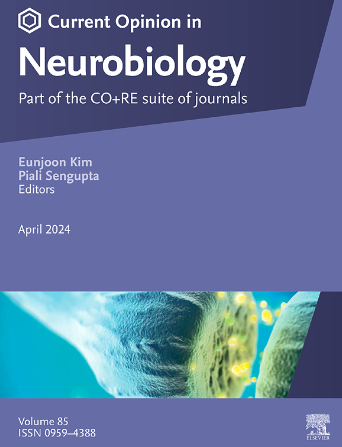跨时间尺度遗忘的神经生物学机制。
IF 5.2
2区 医学
Q1 NEUROSCIENCES
引用次数: 0
摘要
动物王国里每一个会学习的物种,也会忘记。尽管学习和遗忘之间存在这种平衡,但大多数关于记忆的神经科学探索都集中在学习是如何发生的,最近的研究将记忆的记忆印迹确定为假定的生物基质。在这里,我们回顾一篇新兴的文献,与之相反,它探讨了我们的大脑是如何遗忘的。这些研究表明,遗忘涉及一系列广泛的机制,这些机制的作用是降低印迹的可及性。然而,可访问性的变化出现在不同的时间尺度上。在短时间尺度上,遗忘是由大脑状态的波动所调节的,这种波动每时每刻都在改变记忆印迹的可及性。从中期和长期来看,遗忘在一定程度上取决于重新连接记忆印迹的机制,使记忆印迹逐渐难以被获取。从这个角度来看,遗忘包含了一系列调节印迹可及性的可塑性机制,也许是为了优先考虑那些最及时或与手头情况相关的记忆。本文章由计算机程序翻译,如有差异,请以英文原文为准。
Neurobiological mechanisms of forgetting across timescales
Every species in the animal kingdom that learns, also forgets. Despite this balance between learning and forgetting, most neuroscientific explorations of memory have focused on how learning occurs, with recent studies identifying engrams as putative biological substrates for memory. Here we review an emerging literature that, in contrast, explores how our brains forget. These studies reveal that forgetting engages a broad collection of mechanisms that function to reduce engram accessibility. However, changes in accessibility emerge on vastly different timescales. At short timescales, forgetting is modulated by fluctuations in brain states that alter engram accessibility in a moment-to-moment fashion. In the intermediate- and long-term, forgetting depends, in part, on mechanisms that rewire engrams, rendering them gradually harder to access. Viewed this way, forgetting encompasses a family of plasticity mechanisms that modulate engram accessibility, perhaps in order to prioritize those memories that are most timely or relevant to the situation at hand.
求助全文
通过发布文献求助,成功后即可免费获取论文全文。
去求助
来源期刊

Current Opinion in Neurobiology
医学-神经科学
CiteScore
11.10
自引率
1.80%
发文量
130
审稿时长
4-8 weeks
期刊介绍:
Current Opinion in Neurobiology publishes short annotated reviews by leading experts on recent developments in the field of neurobiology. These experts write short reviews describing recent discoveries in this field (in the past 2-5 years), as well as highlighting select individual papers of particular significance.
The journal is thus an important resource allowing researchers and educators to quickly gain an overview and rich understanding of complex and current issues in the field of Neurobiology. The journal takes a unique and valuable approach in focusing each special issue around a topic of scientific and/or societal interest, and then bringing together leading international experts studying that topic, embracing diverse methodologies and perspectives.
Journal Content: The journal consists of 6 issues per year, covering 8 recurring topics every other year in the following categories:
-Neurobiology of Disease-
Neurobiology of Behavior-
Cellular Neuroscience-
Systems Neuroscience-
Developmental Neuroscience-
Neurobiology of Learning and Plasticity-
Molecular Neuroscience-
Computational Neuroscience
 求助内容:
求助内容: 应助结果提醒方式:
应助结果提醒方式:


